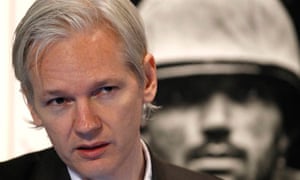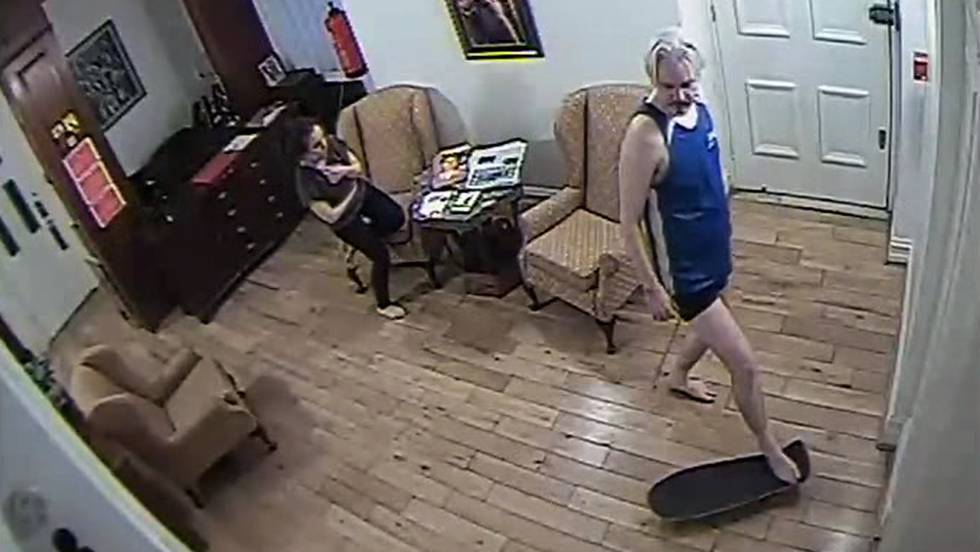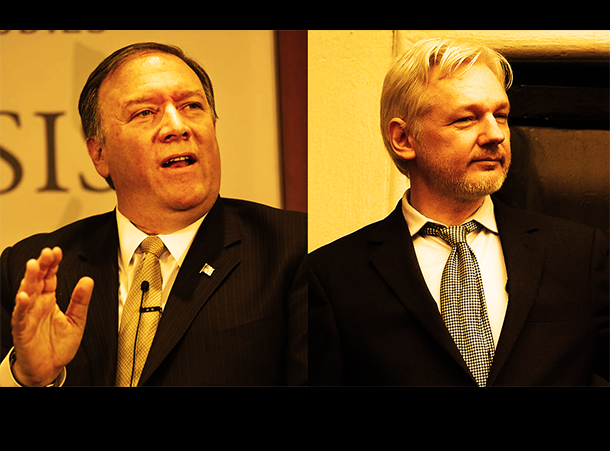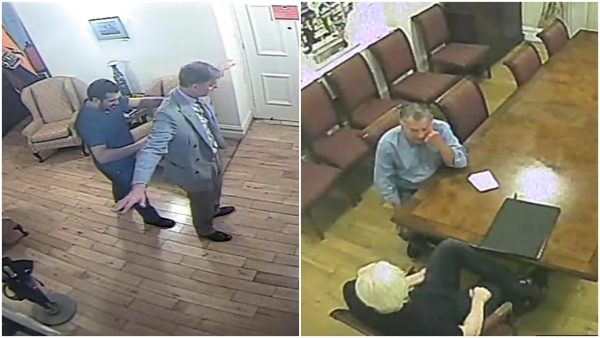
Media Silent on CIA Plot That Targeted Assange
Max Blumenthal / The Grayzone.com
(September 18, 2020) — Despite being spied on and having their privacy invaded by the UC Global firm that targeted Assange, reporters from major US news outlets have said nothing in protest. Meanwhile, new evidence of that firm’s CIA links has emerged.
A Spanish security firm apparently contracted by US intelligence to carry out a campaign of black operations against Julian Assange and his associates spied on several US reporters including Ellen Nakashima, the top national security reporter of the Washington Post, and Lowell Bergman, a New York Times and PBS veteran.
To date, Nakashima and her employers at the Washington Post have said nothing about the flagrant assault on their constitutional rights by UC Global, the security company in charge of Ecuadorian embassy in London, which seemingly operated under the watch of the CIA’s then-director, Mike Pompeo. PBS, the New York Times, and other mainstream US outlets have also remained silent about the US government intrusion into reporters’ personal devices and private records.
The Grayzone has learned that several correspondents from a major US newspaper rebuffed appeals by Wikileaks to report on the illegal spying campaign by UC Global, privately justifying the contractor’s actions on national security grounds.

UC Global secretly spied on Julian Assange and other journalists.
UC Global spied on numerous journalists with the aim of sending their information to US intelligence through an FTP server placed at the company headquarters and through hand-delivered hard drives.
Nearly all of those reporters have so far ignored or refused invitations to join a criminal complaint to be filed in Spanish court by Stefania Maurizi, an Italian journalist whose devices were invaded and compromised during a visit to Assange.
Proof of UC Global’s illegal spying campaign and the firm’s relationship with the CIA emerged following the September 2019 arrest of the company’s CEO, David Morales. Spanish police had enacted a secret operation called “Operation Tabanco” under a criminal case managed by the same National Court that orchestrated the arrest of former Chilean military dictator Augusto Pinochet years before.
Morales was charged in October 2019 by the Spanish court with violating the privacy of Assange and abusing his attorney-client privileges, as well as money laundering and bribery. A mercenary former Spanish special forces officer, Morales also stood accused of illegal weapons possession after two guns with the serial numbers filed off were found during a search of his property.
The documents and testimony revealed in court have exposed shocking details of UC Global’s campaign against Assange, his lawyers, friends, and reporters. Evidence of crimes ranging from spying to robberies to kidnapping and even a proposed plot to eliminate Assange by poisoning has emerged from the ongoing trial.
In an investigation for The Grayzone this May, this reporter detailed how the Las Vegas Sands corporation of Trump mega-donor Sheldon Adelson functioned as an apparent liaison between UC Global and Pompeo’s CIA, presumably contracting the former on behalf of the latter.

Vegas casino-billionaire and major GOP donot Sheldon Adelson alegedly helped CIA and Secretary of State Mike Pompeo to fund UC Global.
It was the second time Adelson’s company had been identified as a CIA asset. (The first was in 2010, when a private intelligence report sponsored by gambling competitors alleged that his casino in Macau was sending footage of Chinese officials gambling so they could be blackmailed into serving as CIA informants).
The story placed the Trump organization at the center of a global campaign of surveillance and sabotage that ruthlessly targeted journalists, including Assange and virtually every reporter he came into contact with since 2017.
For the past four years, the Washington press corps has howled about Trump’s angry browbeating of the White House press pool, treating his resentful outbursts as a grave threat to press freedom. At the same time, it has reacted with a collective shrug to revelations that a firm that was, by all indications, contracted by the Trump administration’s CIA to destroy Assange had spied on prominent American national security reporters.
More revealingly, some of the reporters who had their personal information and notes stolen by UC Global, the apparent CIA contractor, have not said a word about it.
Maurizi, the Italian reporter who is filing a lawsuit against UC Global and serving as a witness in the current case before the Spanish judge, told this reporter she was stunned by the mainstream US media’s passive attitude. “Imagine if Putin had done anything like this. Just imagine what a scandal this would be,” she remarked to the Grayzone. “It would be a giant scandal all around the world. But instead, [US media] is saying nothing.”
Randy Credico, a comedian, social justice activist, and longtime advocate for Assange’s freedom, also attempted to generate media interest in the spying scandal when he learned that UC Global had snooped on him in the embassy. “I went to everybody, I went to MSNBC, to the Wall Street Journal, CNN, to journalists I knew, and I couldn’t get anyone interested,” Credico complained to The Grayzone.

“The Agency of the Stars and Stripes Wants to See Us”
In his first public address as CIA director, Mike Pompeo branded Assange’s Wikileaks as “a non-state hostile intelligence service often abetted by state actors like Russia” and outlined a “long term” campaign of counter-measures against the crusading media organization. At the time, Assange was trapped in the Ecuadorian embassy in London and hosting regular visits there from his legal team, friends, and an array of reporters.
Throughout 2017, UC Global’s Morales traveled frequently from Spain to the US to orchestrate the campaign against Assange. At several points, he issued spying directives from inside the Venetian hotel belonging to Adelson’s Sands. He boasted to his employees that he was working for “the dark side,” and referred to the forces that had contracted his services as his “American friends.”
“Sometimes, when I insistently asked him who his ‘American friends’ were, on some occasions David Morales answered that they were ‘the US intelligence,’” a former UC Global business partner testified before the Spanish court.
During a January 2017 visit to Adelson’s Las Vegas-based Venetian hotel, Morales and an employee exchanged several texts on Telegram about an important trial run for UC Global’s new client. “I want you to be alert because according to what they tell me they may be controlling us so that everything that is confidential so make it encrypted,” Morales said.
“Everything is related to the London issue…” he continued, making reference to the Ecuadorian embassy that housed Assange. “Those who control [it] are the friends of the USA.”
In May 2017, Telegram messages by Morales show him making further references to his apparent work for the US government: “I am on a subject in which I foresee that they are going to start monitoring us…” he remarked to an employee. “How are we protected for that?” After his worker outlined UC Global’s systems, Morales replied that he did not expect any problems “for those who want to see us.”
“We can do that if the agency of the stars and stripes wants to see us,” the UC Global CEO continued.
“I imagined I was going to go there,” the employee replied.
That July, Morales was in Miami, on a mission to provide “the agency of the stars and stripes” with a budget for the hidden microphones UC Global planned to place inside the CCTV system at the Ecuadorian embassy in London.
In his Telegram chats, Morales responded with Trump badges to several messages from a UC Global employee — a seeming reference to the US administration that had contracted his services. As this reporter revealed in May, Morales not only oversaw the secret installation of microphones in the embassy’s CCTV system and hidden microphones under a fire extinguisher in its conference room, he attempted to establish a feed to a separate, exterior storage server managed from the US, doing his best to keep the operation hidden from Ecuador’s intelligence services. He referred to the entity on the receiving end of the CCTV footage and audio as “the American client.”
In a December 2017 email sent from Adelson’s Venetian hotel, Morales ordered his employees at the embassy to inform him if any visitors “carry mobile phones, pen drives, computers, or any electronic equipment,” and to “make sure the protocol is maintained and they leave their electronics at the entrance.”
By this point, UC Global’s spying dragnet had ensnared practicaly everyone who entered the embassy to visit Assange. Among the most prominent victims was then-US Rep. Dana Rohrabacher, who was allegedly dispatched by Trump in August 2017 to offer a presidential pardon in exchange for Assange providing concrete evidence the Russian government did not hack the DNC’s email server. Assange, who has never revealed a source, refused the offer.
Pamela Anderson, the Canadian-American actress and close friend of Assange, had her email hacked into by UC Global when a guard took advantage of a moment when she left the room to photograph a Gmail password she had written on a notepad. UC Global not only spied on Assange’s legal team, violating attorney-client privilege, it hounded Stella Morris, a member of the Wikileaks legal team who became Assange’s romantic partner, hatching a failed plot to steal her infant son’s diapers from a trash bin in a bid to obtain his DNA and prove his genetic link to Assange.
In December 2017, UC Global learned that Assange and his legal team were formulating a plan for him to exit the embassy under the protections granted to diplomats under the Vienna Convention on Diplomatic Relations. Morales ordered his employees to act aggressively to sabotage it, demanding copies of all video recordings, presumably for delivery to US intelligence.
Ellen Nakashima, a national security reporter for the Washington Post, visited the Ecuadorian embassy to interview Assange on December 15. According to notes by a UC Global guard named Jose Antonio Torre, Nakashima arrived with Souad Mekhennet, a colleague at the Post who was not allowed inside because she did not have her passport.
The two reporters were working on a profile of Andy Müller-Maguhn, a German cyber expert and one of Assange’s closest confidants, who escorted them to London. (UC Global employees photographed the contents of Müller-Maguhn’s backpack and the secret number inside his encrypted phone.)
When Nakashima entered the meeting with Assange, Torre held her voice recorder and cellphone. He recounted in notes to Morales how he removed the battery from the phone, then photographed her device.
Those notes contained a remarkable admission: as Nakashima left the embassy, Torre said, “I tried to keep her tape recorder but the woman remembered it at the exit.”

Notes by UC Global employee “Jose Antonio” detailing Ellen Nakashima’s visit and his attempt to steal the Washington Post reporter’s voice recorder
In her January 17, 2018 report on her visit to the embassy, Nakashima made reference to a warning by Assange about spy cameras and his use of a white noise machine to foil hidden surveillance devices like the hidden microphone that was later revealed under the fire extinguisher in the room. The Washington Post reporter made no mention, however, of the UC Global guard’s attempt to pocket her voice recorder.
Nakashima did not respond to a request for comment sent to her publicly listed Washington Post email by The Grayzone.
She was not the only reporter illegally snooped on by UC Global spies posing as embassy guards. Lowell Bergman, the award-winning investigative reporter and New York Times and PBS veteran, had his phone opened and SIM card removed without his permission by a UC Global employee when he met with Assange on October 6, 2017.

Journalist Lowell Bergman’s phone (above) was opened and photographed by a UC Global employee without his permission.
The Grayzone obtained footage and audio of Bergman’s meeting with Assange that was captured by UC Global’s spy cameras and likely delivered to the CIA.

Left: A UC Global spy pats Lowell Bergman down at the entrance to Ecuador’s embassy in London. Right: Footage secretly recorded by UC Global of Bergman’s meeting with Assange.
Intercept senior correspondent Glenn Greenwald and his husband, David Miranda, were secretly videotaped by UC Global spies, during a September 16, 2017 meeting with Assange.
While Greenwald was in the conference room with Assange, a UC Global employee opened his passport and photographed a visa showing he had visited Russia, a flagrant violation of his privacy carried out under orders from Morales. (The Grayzone has viewed a UC Global photograph taken of Greenwald’s visa that was sent to company headquarters). UC Global footage of Greenwald and Miranda’s meeting with Assange, who is seen in the upper right-hand corner activating a white noise machine.
Over two years later, when Greenwald learned of the violation of his constitutional rights, he protested on Twitter, “This is the US Government/CIA spying on its own citizens, including our phones, with no warrants.”
Unlike Greenwald, Bergman has said nothing in public about being spied on by an alleged CIA contractor. However, he has agreed to serve as a witness in the trial of UC Global’s Morales, according to a member of Wikileaks’ legal team. He did not respond to an emailed request for comment.

UC Global secretly recorded meeting between Assange an reporters with The Intercept.
US Reporters Justify CIA Spying on Assange
Throughout 2019 and during the first several months of this year, Wikileaks and its allies worked phone lines and raced across time-zones to generate media interest in the CIA spying scandal they had uncovered through the Spanish prosecution of UC Global’s Morales.
Correspondents from a major US newspaper were presented with detailed evidence of UC Global spying on Assange and his associates, and documentation of the firm’s relationship with the CIA and Sheldon Adelson, a Wikileaks source told The Grayzone.
Not only were the reporters initially uninterested in the spying scandal, the Wikileaks source said one correspondent justified the CIA’s surveillance on national security grounds. “He said, well, that’s what an intelligence service is supposed to,” the source recalled, describing the experience as “crazy.”
In December 2019, the New York Times covered the CIA operation against Assange in a single article by Raphael Minder. Framing the case in terms of “conflicting interpretations,” Minder claimed “it remains unclear whether it was the Americans who were behind bugging the embassy.”
Omitted in Minder’s article were all the obvious signs of UC Global’s collaboration with US intelligence, from Morales’ comment that “the agency of the stars and stripes will see us” to witness testimony that explicitly stated the company had been contracted by the CIA.
“The New York Times was basically saying there was no evidence that US intelligence was involved,” Maurizi commented to The Grayzone. “What do they want? A text message from the CIA saying, ‘we did it?’”

Stefania Maurizi was one of the reporters secretly surveilled while meeting with Assange.
One Reporter’s Lonely Fight for Justice
Maurizi was among the reporters who produced the most critical coverage of the political persecution of Assange and Wikileaks over the years. While reporting for Italy’s La Repubblica, Maurizi visited Assange frequently at the Ecuadorian embassy. When she met him there in December 2017, UC Global guards invaded her personal devices after seizing them at the entrance of the diplomatic facility.
“They took my two telephones, one which was encrypted; my iPod, and many USB sticks,” Maurizi told The Grayzone this May. “There was no way to get my backpack back. The guard told me, ‘Don’t worry, everything will be fine, no one will access your materials or open your backpack.’ I was very suspicious. I wasn’t even allowed to bring a pen inside to take notes.”
The reporter learned later that UC Global employees photographed the unique International Mobile Equipment Identity number and the SIM card number inside the her phone. This seemed to be what they needed to hack into the device.
Maurizi later found that calls, emails, and texts from her editors, then at the Italian daily La Repubblica, were failing to go through. “No one could explain this disruption,” Maurizi said. “I wonder if it had anything to do with these espionage activities. To this day I cannot say.”

UC Global photo of Stefania Maurizi’s phone.
Maurizi plans to file a criminal complaint against UC Global in Spain’s National Court this October on behalf of journalists victimized by the security firm. So far, she has been unable to find any reporters willing to sign on to her complaint.
She said she asked the Washington Post’s Nakashima to join, but never received a reply. Bergman, for his part, told her he was not interested in participating.
“I Couldn’t Get Anybody Interested” in the CIA Spying on US Journalists
Like Maurizi, Randy Credico was spied on by UC Global during a visit to Assange at the Ecuadorian embassy. When he learned his meeting had been secretly videotaped, he embarked on a frenetic campaign to generate media coverage of the violation of his constitutional rights by the CIA.
Credico is a comedian, award-winning criminal justice reformer, and advocate for Assange’s freedom who emerged as a player in the Russiagate saga when Robert Mueller’s investigative team called him as a witness.
After being falsely accused of serving as a “backchannel” between Wikileaks and former Trump advisor Roger Stone, Credico made numerous high-profile appearances on MSNBC and CNN, and rubbed shoulders with Beltway media honchos as a guest at the White House Press Correspondents Dinner.
Credico told The Grayzone he attempted to convince his contacts in mainstream media to cover the UC Global-CIA spying scandal. But in every instance, he was met with a cold shoulder.
“I went to everybody,” he recalled. “I went to MSNBC, to the Wall Street Journal, CNN, to journalists I knew, and I couldn’t get anyone interested. I mean, all these reporters hate Trump, and here you had Pompeo and Sheldon Adelson, the guy who finances Trump, breaking the law. You would think this would be a big deal to these lean forward progressives. And they haven’t said shit. It’s appalling that they haven’t come forward and said something about this.”
To be sure, CNN Español published a lengthy December 2019 report on the UC Global spying ring. But it relied heavily on the perspective of the firm’s disgraced former CEO, Morales. “No, I am not a double agent and it is absurd [to say] that I traveled to the US to personally hand over information to the CIA,” Morales claimed to CNN.
The article was co-authored by Arturo Torres, a right-wing Ecuadorian journalist who was hostile to both Assange and his country’s leftist former president, Raphael Correa. His work has been sponsored by Transparency International, a supposed anti-corruption NGO funded by the US State Department and British government.
Months earlier, in June 2019, CNN’s Torres used material illegally gathered by UC Global to publish a malicious attack on Assange asserting that “there was ‘no doubt that there is evidence’ that Assange had ties to Russian intelligence agencies.”
The article provided no such evidence, however, while falsely claiming that UC Global’s surveillance reports were “compiled for the Ecuadorian government” — not the CIA.
In reality, UC Global’s Morales was desperate to elude Ecuador’s SENAIN intelligence agency, instructing his employees in an email from Adelson’s Venetian hotel, “Nobody can know about my trips, mainly my trips to the USA, because SENAIN is onto us.”

Washington Post Owners “Look Forward to a Successful Relationship with the CIA”
The hysteria triggered by Trump’s victory in 2016 goes a long way toward explaining US mainstream media’s hostility towards Assange. Immediately after conceding defeat, Hillary Clinton blamed “Russian Wikileaks,” deepening the hostility among partisan Democrats toward a dissident journalist then-Vice President Joseph Biden had already branded as a “high-tech terrorist.” Mainstream US media followed in lockstep.
On April 11, 2019, the day Assange was arrested by British police in the Ecuadorian embassy, the New York Times editorial board celebrated with two cheers: “The [Trump] administration has begun well by charging Mr. Assange with an indisputable crime.”
The Washington Post editorial board was more enthused by the publisher’s arrest, proclaiming, “Mr. Assange’s case could conclude as a victory for the rule of law, not the defeat for civil liberties of which his defenders mistakenly warn.” The Post even demanded Assange’s extradition to the US, hoping that he could be coerced into becoming a “cooperating witness” and potentially provide information about “Russian intelligence’s efforts to undermine democracy in the West.”
While the loathing of Assange in Trump-era Washington helps explain mainstream media’s shunning of the jailed journalist, the increasingly cozy relationship papers like the New York Times and Washington Post enjoy with the US intelligence apparatus offers a more substantial basis for understanding the media’s silence on the UC Global scandal.
Throughout the Trump-Russia investigation and the various intrigues that comprised Russiagate, the legacy publications of US media fed audiences with an endless stream of stories based on “high confidence” assessments and often dubious narratives furnished by anonymous US intelligence agents.
In the Trump era, the corporate news media became a de facto bulletin board for the intelligence apparatus. The New York Times even admitted it sent a June 2019 story on US cyber-attacks against Russia’s electric grid to the government for approval before publishing.
The Washington Post, where Nakashima covers national security issues, is owned by the big tech corporation, Amazon. In 2014, Amazon signed a $600 million contract with the CIA to host its cloud server. “We look forward to a successful relationship with the CIA,” Amazon declared in an official statement. Four years later, Amazon was awarded a $10 billion contract from the Pentagon to oversee its Joint Enterprise Defense Infrastructure program.
Notably, when Nakashima sought a meeting inside the Ecuadorian embassy in 2017, her request form listed her company not as the Washington Post, but as Amazon.
While Assange’s lawyers fought his extradition in a London courtroom this September 15, Nakashima was live-tweeting coverage of ThreatCon 2020, a conference of top US intelligence officials and private spies gathered on a private island off the coast of Georgia. Her colleague, Washington Post assistant editor David Ignatius, and New York Times national security correspondent David Sanger, participated directly in the exclusive spook-fest. Among the sponsors of the conference was InQTel, the CIA-sponsored research and development firm.
This September, the US Department of Justice issued a letter to the Spanish judge overseeing the UC Global trial that obstructed any possibility of cooperation. Like much of the US media, the government in Washington wants nothing to do with the devastating evidence tumbling out of a courtroom in Madrid.
Max Blumenthal, the editor-in-chief of The Grayzone, is an award-winning journalist and the author of several books, including best-selling Republican Gomorrah, Goliath, The Fifty One Day War, and The Management of Savagery. He has produced print articles for an array of publications, many video reports, and several documentaries, including Killing Gaza. Blumenthal founded The Grayzone in 2015 to shine a journalistic light on America’s state of perpetual war and its dangerous domestic repercussions.
Posted in accordance with Title 17, Section 107, US Code, for noncommercial, educational purposes.